Learn how to oven-roast a bone-in turkey breast at 350°F the easy way—crispy skin, juicy meat, and no complicated steps or temperature flipping.
Perfect for Thanksgiving or smaller gatherings. Cook any bone-in turkey breast this way, whether previously frozen or fresh. Boneless breasts will cook a little faster.
🤔 Quick Answer: How Long to Cook a 5 to 10 lb Turkey Breast in the Oven
- Oven temperature: 350°F
- Oven time: Bake for 16–20 minutes per pound (about 2 hours for a 7-lb breast). All estimated times are for bone-in turkey breasts
- Finish temperature: 165°F in the thickest part
✅ You can also bake at 325°F or 375°F if you prefer — just adjust the time.
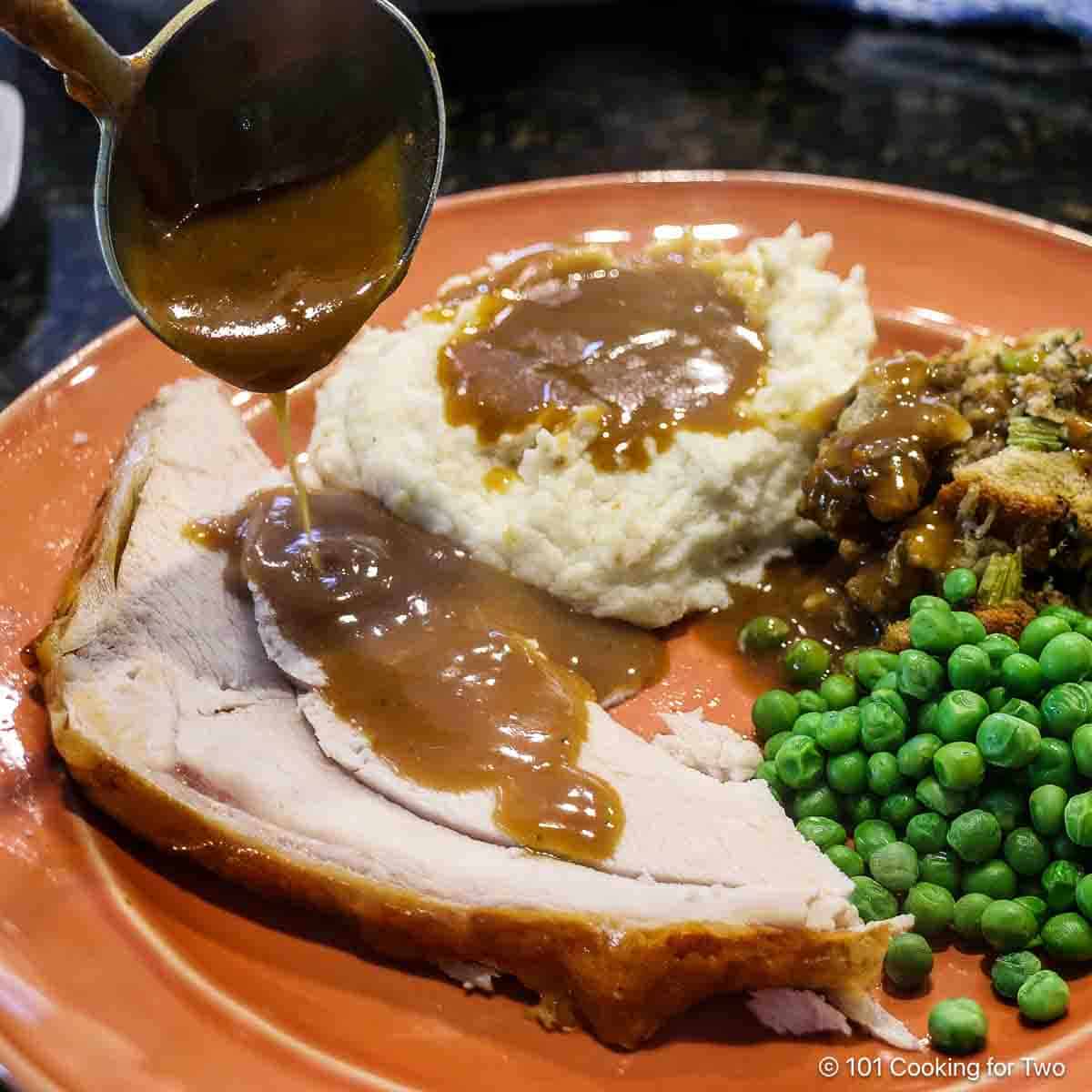
Jump To (scroll for more)
- 🧡 Why You’ll Love This Recipe
- 🦃 Ingredients
- 👨🍳Quick Overview: How to Bake a Bone-In Turkey Breast
- ⏰ How Long to Cook a Turkey Breast in the Oven
- 🌡️ Best Oven Temperature for Turkey Breast (350°F)
- 🌡️ The best turkey temperature is 165°F
- 😊 Tips For the Best Results
- 🧂 Seasoning
- ❓ How Much Turkey to Buy Per Person?
- ❄️ How to Thaw a Turkey Breast
- 🛒Shopping
- 🧂 Should You Brine a Turkey Breast? (Usually Not)
- 🥣 How to Make Turkey Gravy
- 🍴 Serving and Related Recipes
- ❄️What To Do with Leftovers
- ❓ FAQs
- ⚕️Food Safety
- 📖The Recipe Card
Featured Comment from Norma :
⭐⭐⭐⭐⭐"This is the best, most straightforward instruction I have seen.
Thank you."
🧡 Why You’ll Love This Recipe
- One temperature, one method — no starting hot, no flipping, no fuss.
- Works for any turkey breast — bone-in, boneless, or even fresh (with a quick brine).
- Perfect for small gatherings — ideal for 5 to 10 lb turkey breasts.
- Gravy that actually belongs at the table — uses drippings if you’ve got them, but it’s easy from scratch and worth doing.
- Great for leftovers — turkey tetrazzini, pot pie, and more.
🦃 Ingredients
- Turkey breast – bone-in (most common) or boneless, 5 to 10 pounds, fully thawed. Boneless will usually cook a little faster per pound, while a fresh breast may benefit from a brine.
- Butter or oil – for brushing before and during roasting.
- Seasoning – kosher salt works fine, or add herbs like thyme, rosemary, or sage.
- For gravy (optional) – flour, salt, pepper, and broth — turkey if available (usually from a concentrated gravy base), or chicken broth.
👨🍳Quick Overview: How to Bake a Bone-In Turkey Breast
1. Prep
1a. Completely thaw and pat the breast dry. Set aside or discard any extra parts, including gravy packets.
1b. Preheat oven to 350°F. Position the oven rack so the center of the turkey breast will sit in the middle of the oven—usually one or two positions below center.
1c. Prep a roasting pan with a rack (if available) and a good coat of cooking spray.
2. Remove the backbone and trim
If present, cut out the backbone using a heavy knife or kitchen shears. Trim off any excess skin (like the neck flap) as needed.
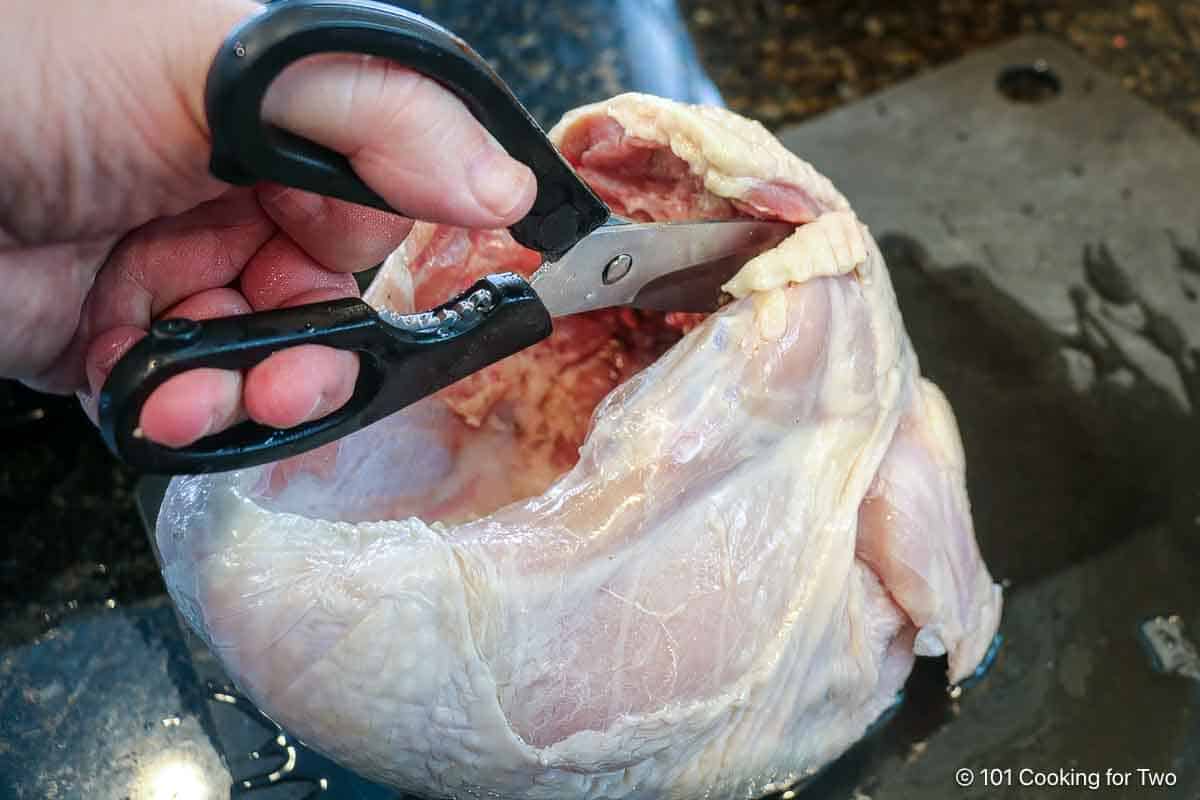
3. Break the rib sections
Use firm pressure to break back the rib sections so the breast sits flat and stable.
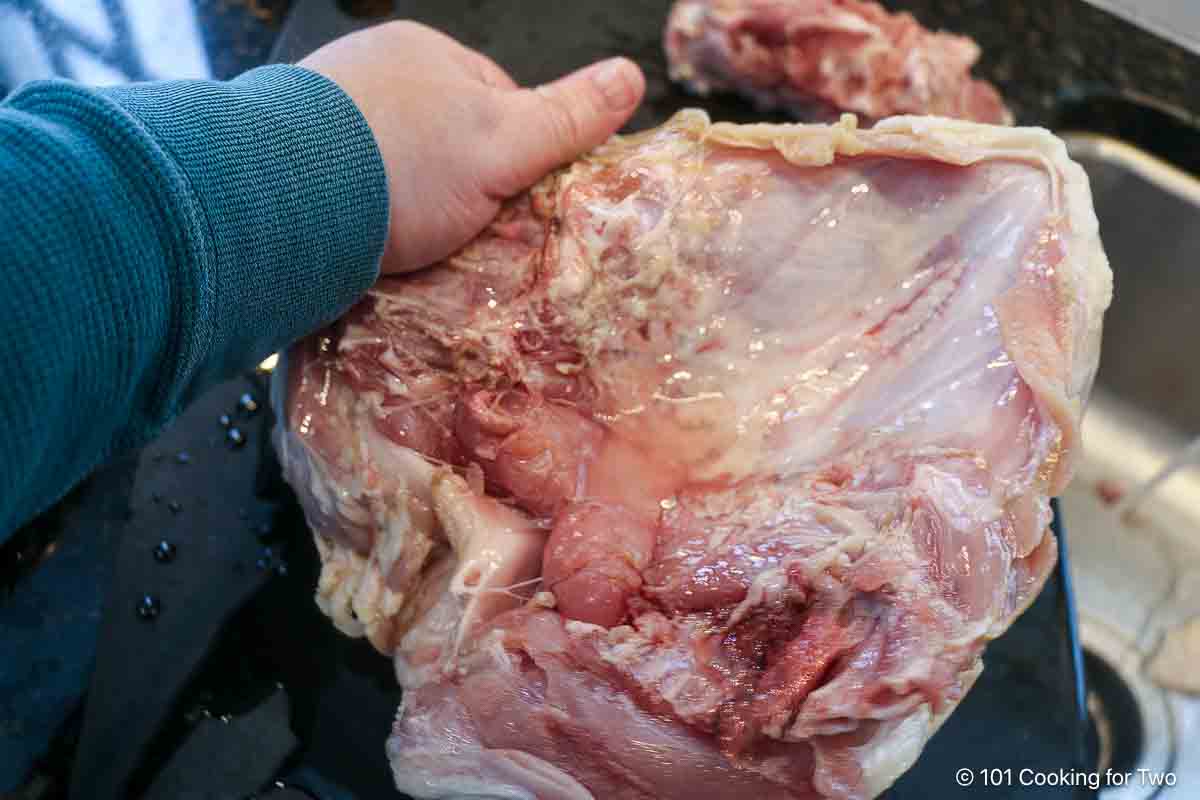
✅ Pro Tip: The natural weak spot is about an inch from the breastbone. Fold the ribs back to help support the breast while roasting.
4. Position the turkey
Move the breast to a roasting pan, using the broken-back rib sections to help stabilize it upright.
(See image for positioning—yes, that pop-up timer is just along for the ride.)
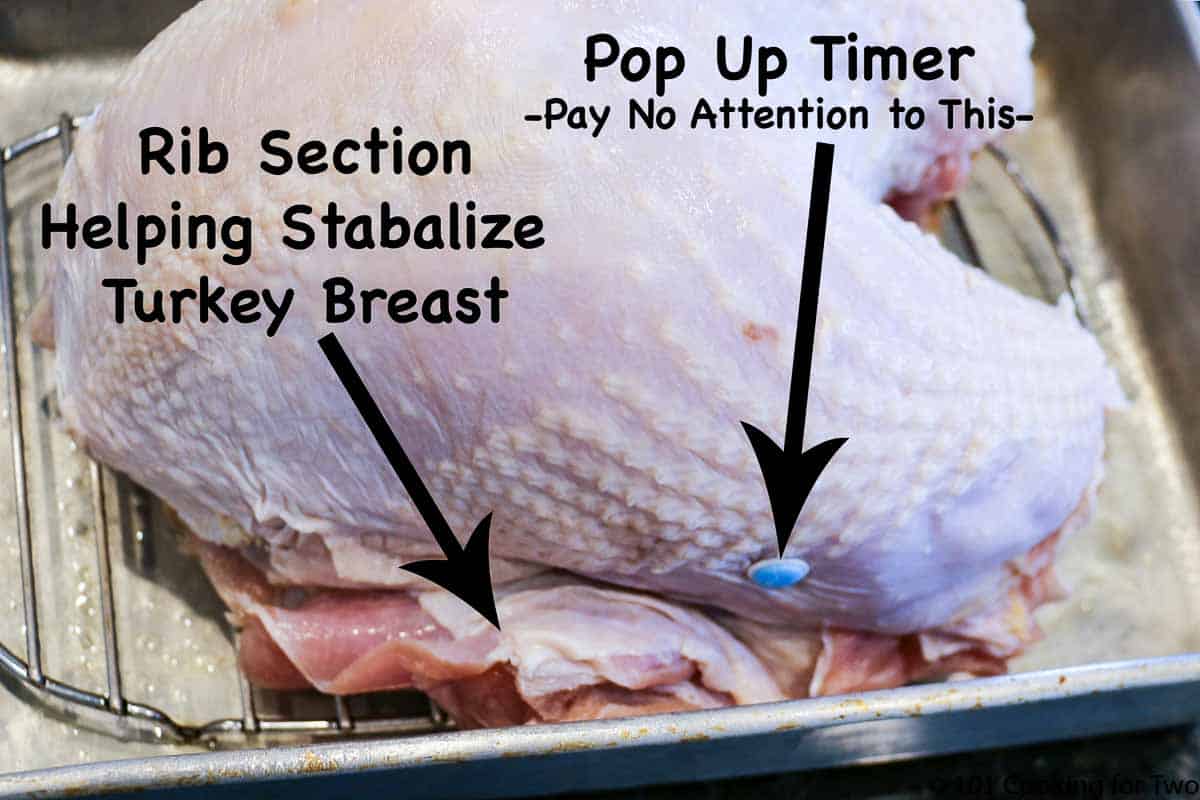
5. Season and roast
Brush with oil or melted butter and sprinkle with kosher salt. Add herbs or other seasoning if desired.
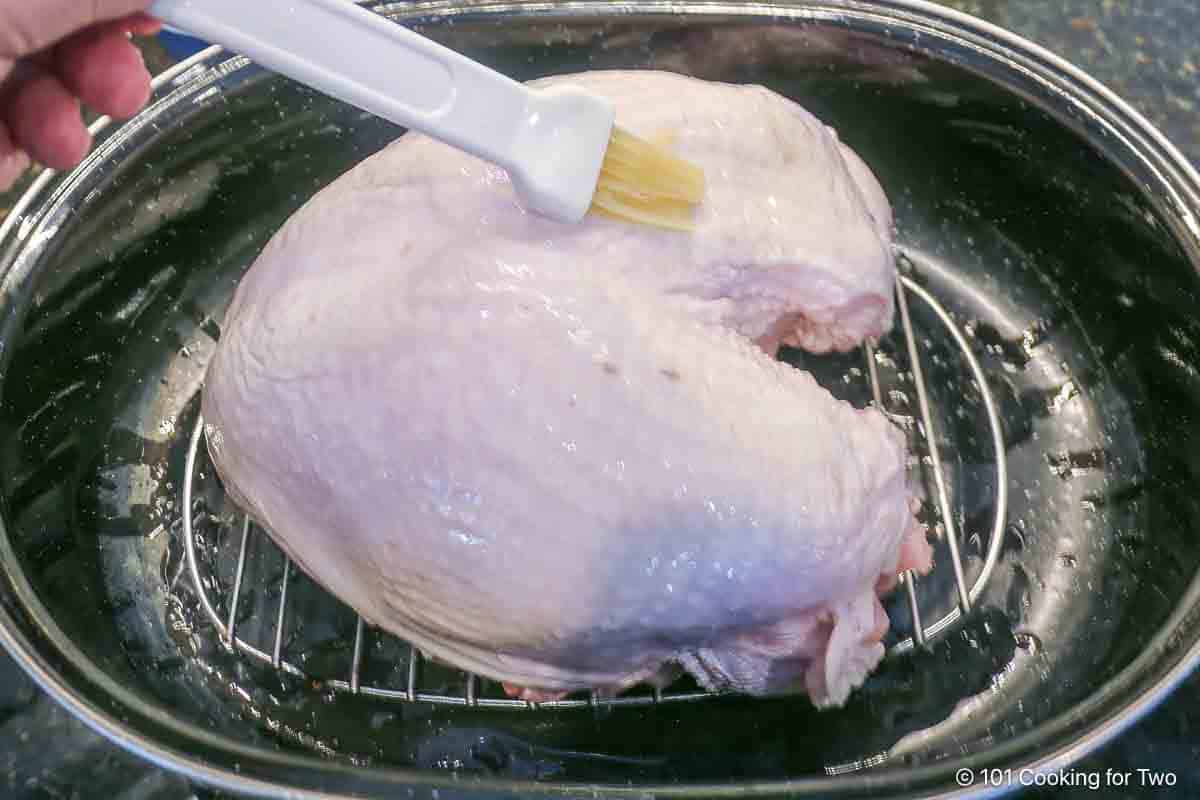
Roast at 350°F until the thickest part reaches 165°F — a 7-pound breast will oven-bake for about 2 hours.
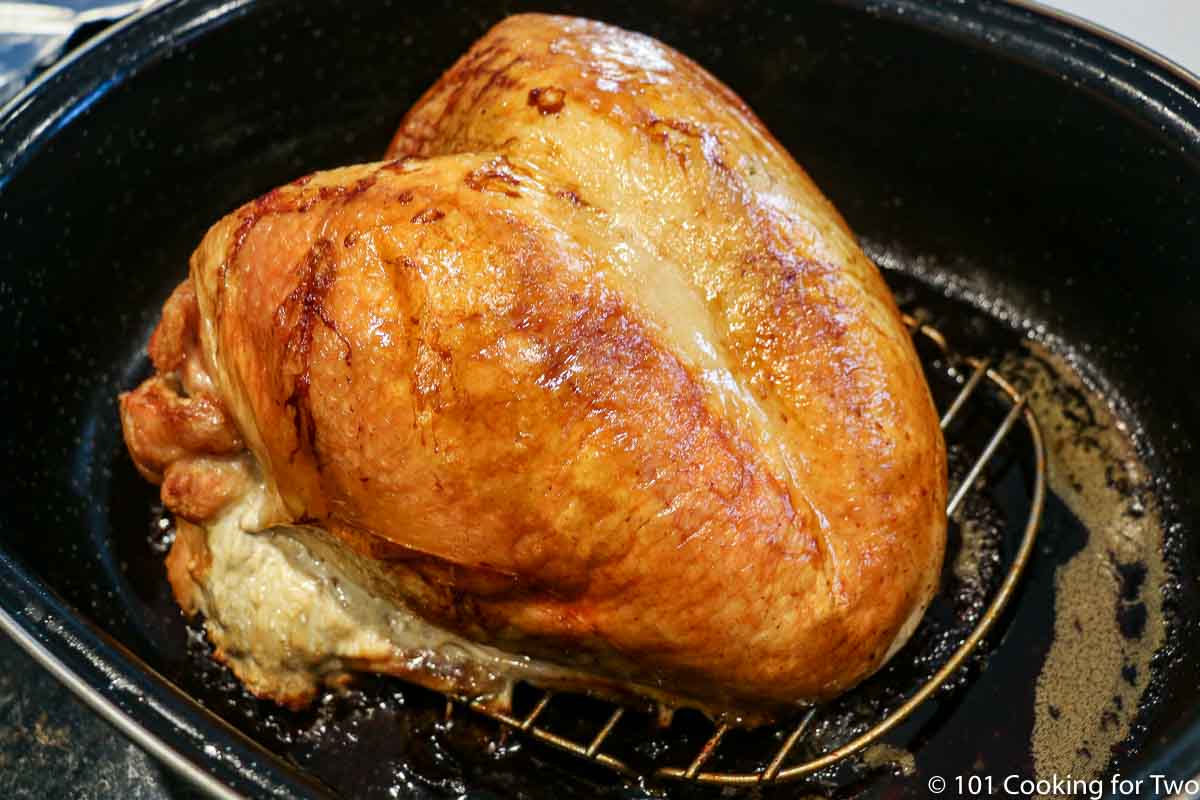
✅ Pro Tip: Basting isn’t required, but I like to brush on a little more butter or oil halfway through. Rotate the pan 180° in case your oven has hot spots—most do, even if you don’t think so.
Let rest, tented with foil, for 10–15 minutes before carving. Perfect time to make gravy—see the recipe card for instructions.
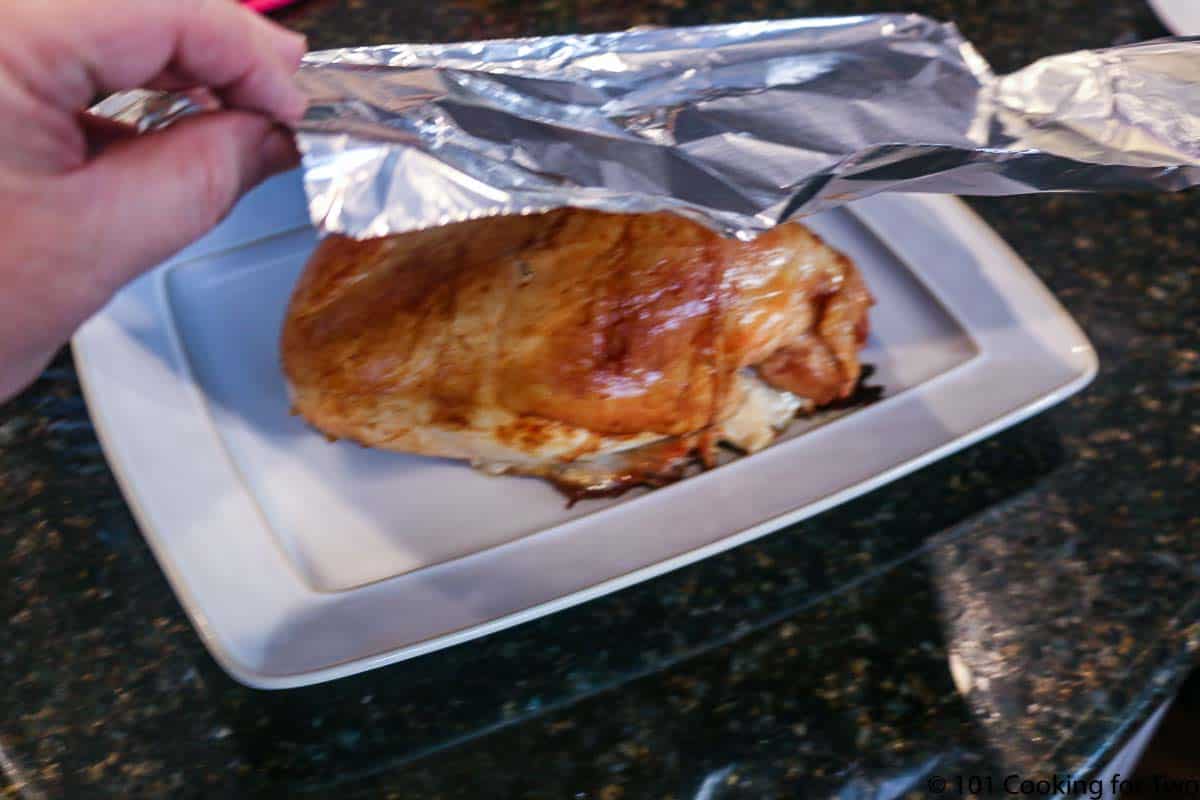
👇 Scroll down for the printable recipe card and step-by-step photo instructions—or keep reading for extra tips, veggie sides, and serving ideas.
⏰ How Long to Cook a Turkey Breast in the Oven
The general rule is to bake a bone-in turkey breast for 16 to 20 minutes per pound in a 350°F oven.
Estimated baking times at 350°F (planning only):
- 5 to 6 pounds: 1 hour 30 minutes to 1 hour 45 minutes
- 7 to 8 pounds: about 2 to 2 hours 15 minutes
- 9 to 10 pounds: about 2 hours 15 minutes to 2 hours 30 minutes
You can also bake at 325°F or 375°F, but adjust the time.
Cooking time depends on the thickness of the meat, not just the weight. Larger breasts tend to cook faster per pound than smaller ones.
✅ Boneless turkey breasts bake the same way at 350°F, but they’re usually a bit quicker per pound. Start checking with a thermometer 10–15 minutes earlier than you would for bone-in.
🛑 Important: Always bake to an internal temperature of 165°F in the thickest part—not by time alone. Residual heat may raise the temperature slightly after removing it from the oven.
🌡️ Best Oven Temperature for Turkey Breast (350°F)
Stick with 350°F. It’s the sweet spot for crispy skin and juicy meat—without fussing with foil or juggling oven settings.
Some recipes tell you to start hot at 425°F, then drop low to 325°F for hours. It looks done early, but you spend the rest of the cook tenting to keep the skin from burning. One steady 350°F does the job without the fuss.
Yes, you can use 325°F, but it takes 1–2 minutes more per pound and the skin won’t brown as well. At 375°F, the skin browns too fast and you’ll likely end up tenting with foil.
A countertop turkey roaster also works well and frees up your main oven. Just use the same temperature and method.
Convection ovens are fine too, but not necessary. They can over-brown the skin, so if you use convection, reduce the temp to 325°F and watch the color.onvection, reduce the temp to 325°F and watch the color.
🌡️ The best turkey temperature is 165°F
The turkey breast is done when the thickest part reaches 165°F. That’s the safe, fully cooked temperature—and the key to juicy, tender meat. For more details, see the USDA turkey safety guidelines.
Don’t bake over 165°F or you’ll dry it out. Don’t stop short either. Some recipes say to pull at 160°F and let carryover heat finish the job. It might get there, but I’d rather be sure I’m serving safe food.
Ignore the pop-up timer. They’re unreliable—sometimes too late (dry turkey), sometimes too early (unsafe). Always use an instant-read thermometer.
Don’t judge by color. Fully cooked turkey can still look slightly pink near the bone. That’s from natural compounds like myoglobin, not undercooking. If the internal temp is 165°F, it’s safe regardless of color.
✅ Boneless turkey breasts follow the same rule—finish at 165°F. They may cook a little faster, so start checking early.
😊 Tips For the Best Results
- Some turkey packages include a neck, gravy packet, or bag of liquid. You could make broth from these, but that’s how you end up spending all day in the kitchen. I recommend skipping it and using my quick gravy method instead—fresh and simple.
- The turkey breast should roast in the center of the oven, so position your rack below center to get it right.
- Optional: Rotate the pan 180° halfway through. You can baste with butter or oil if you like, but it’s not required—rotating helps with oven hot spots more than anything.
- Ignore the pop-up timer. It’s often inaccurate—sometimes too late (dry turkey), sometimes too early (unsafe turkey). Don’t rely on it. And don’t pull it out, or you’ll poke a hole that lets juices escape.
- If the skin is browning too fast near the end, tent it loosely with foil while still in the oven—not to be confused with the foil tent after roasting.
- After roasting, tent and let rest for 10 to 15 minutes before carving. That lets the juices reabsorb into the meat. It's also a great time to make gravy.
🧂 Seasoning
All you really need is kosher salt and a little butter—simple and traditional.
Want crispier skin? Use oil instead of butter.
Feel free to add fresh or dried herbs like sage, thyme, or rosemary. Garlic or dry rubs also work well. For extra flavor, you can tuck herb butter under the skin, but it’s not necessary for juicy results.
Save this recipe!
❓ How Much Turkey to Buy Per Person?
Plan on ½ to 1¼ pounds per person. That sounds like a wide range—and it is—but both ends can be correct.
Remember, number of servings ≠ number of people. Many folks go back for seconds, and most want leftovers (especially if gravy is involved).
❄️ How to Thaw a Turkey Breast
Never thaw turkey at room temperature. It’s not safe. Use one of these two methods:
✅ Refrigerator method (preferred)
Leave the turkey breast unopened in its original packaging and place it on a tray in the refrigerator.
- A 5 to 7 lb breast takes 1½ to 2 days
- I usually give it 3 days, just to be safe
- Breasts over 8 pounds may need longer
⚡ Cold water method (faster)
- Submerge the unopened breast in cold tap water for 3 to 5 hours.
- Don’t use warm or hot water—it’s unsafe and encourages bacterial growth
- Change the water every 30 minutes to keep it below 40°F
🛒Shopping
Like most recipes, the success of cooking a turkey breast depends on obtaining the best final temperature. You must be able to monitor the end point of cooking accurately and avoid overcooking the skin.
Here are some suggestions I like, but you can find many more good products that will work at your local big-box store. All links below are affiliate links, meaning I make a small profit from your purchases. This commission does not affect your price. We are a participant in the Amazon Services LLC Associates Program. As an Amazon associate, I earn from qualifying purchases.
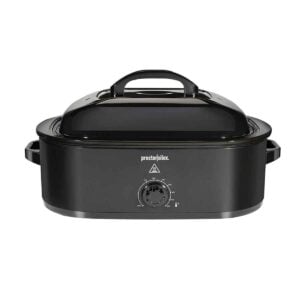
Proctor Silex Turkey Roaster Oven
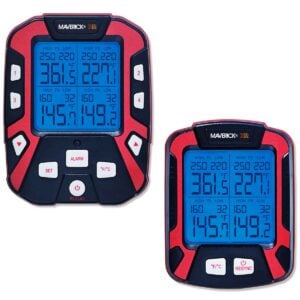
Maverick XR-50 4 Probe Remote Thermometer
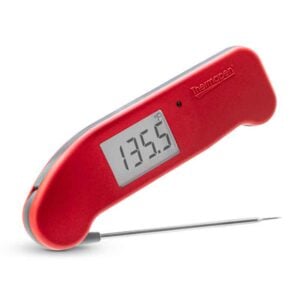
Thermapen™ One from Thermoworks™
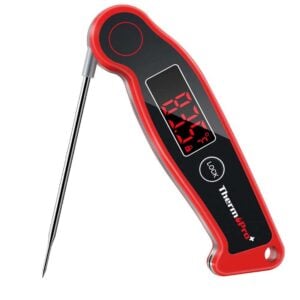
ThermoPro TP19 Instant Read Thermometer
🧂 Should You Brine a Turkey Breast? (Usually Not)
Almost always, no. Most frozen turkey breasts are already injected or pre-brined, even if it’s not obvious on the front of the package. If you brine one of those, you’ll likely end up with mushy or overly salty turkey.
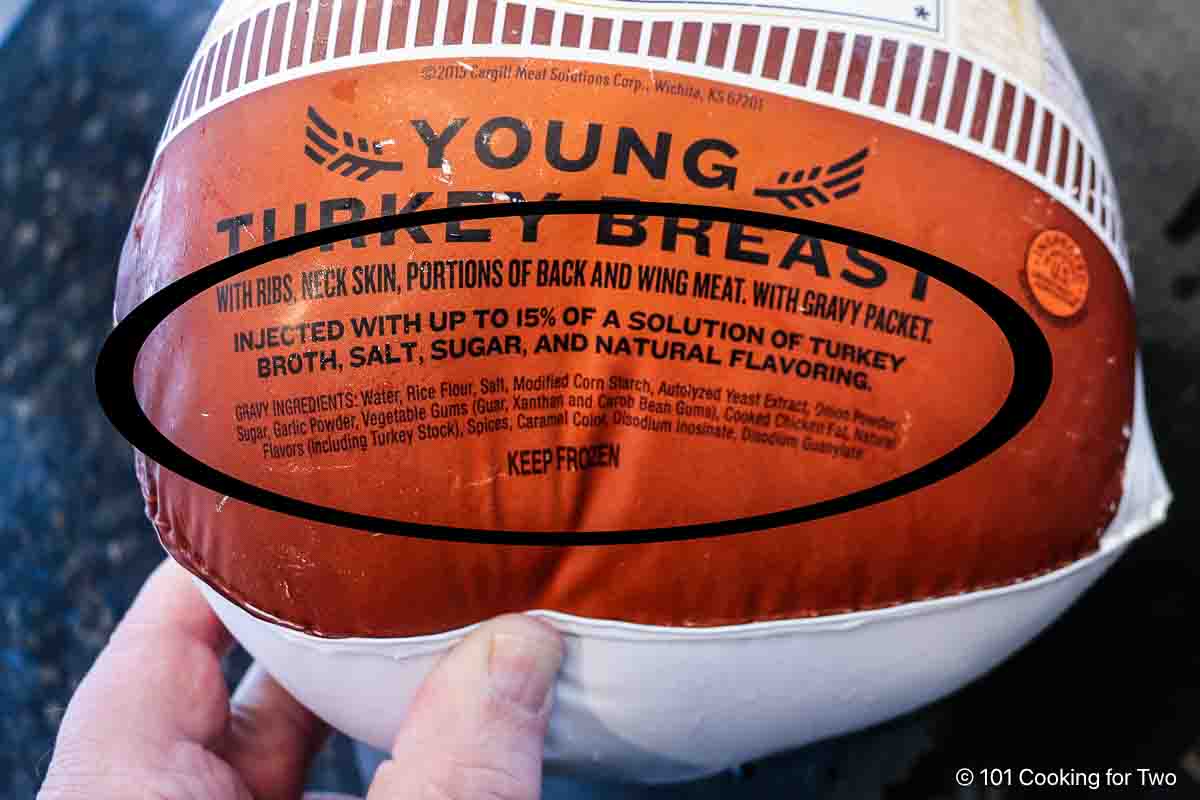
If you happen to have a completely unbrined, uninjected breast, brining can help—but that’s rare. And not needed here. Just follow the instructions and you’ll be fine.
How to brine a turkey breast if indicated?
If you are sure your turkey has not been injected or brined, you can add a simple brine of 1 gallon of water, 1 cup of salt, and ½ cup of sugar for 12 to 24 hours.
🥣 How to Make Turkey Gravy
Of course, you want gravy—but with a turkey breast, you won’t get many pan drippings, so a classic roux-based gravy doesn’t really work.
Instead, this recipe uses a slurry method, combining the drippings you do get with chicken or turkey broth (or gravy base) for a smooth, flavorful result.
Full instructions are in the recipe card. For more on how to make gravy from scratch, see How To Make Gravy at Home.
🍴 Serving and Related Recipes
Besides the mandatory mashed potatoes and peas at our table, we also serve:
Cranberry sauce and other sides are always welcome—go with whatever fits your family traditions.
Looking for more turkey? Try these:
❄️What To Do with Leftovers
Store cooked turkey in an airtight container in the refrigerator for up to four days. It also freezes well for up to four months. Flour-based gravy stores the same way and reheats better than cornstarch-based versions.
We always save extra gravy for leftovers. Warm up chopped turkey in the gravy (add a splash of water if it’s too thick) and serve it over mashed potatoes, sausage dressing, or just by itself.
Want something a little more creative? Try one of these:
- Double Crust Chicken Pot Pie: Swap in leftover turkey for the chicken—it works beautifully.
- Chicken Broccoli Rice Casserole: Use chopped turkey instead of chicken for an easy weeknight meal.
Easy Turkey Tetrazzini
Turkey Tetrazzini is the perfect leftover Thanksgiving turkey recipe. It features tender turkey, creamy sauce, pasta, vegetables, and a crispy Parmesan topping. You may want to cook extra turkey this year for this casserole.
❓ FAQs
No—it’s not safe. For stuffing to be fully cooked, it would need to hit 165°, but by then the turkey would be dry and overdone. For best results, cook the stuffing separately.
No. Bake uncovered so the skin browns. A 5- to 7-pound breast takes about 1¾ to 2 hours at 350°F.
If you have a larger breast, the skin may brown before the meat is fully cooked—just tent lightly with foil near the end to prevent over-browning.
Yes. Boneless turkey breasts cook the same way at 350°F—finish at 165°F in the thickest part. They’re usually a little faster per pound, so start checking with a thermometer about 10–15 minutes earlier than you would for bone-in.
The key is to not overcook it—use a thermometer and pull it at 165°.
If your turkey isn’t injected or pre-brined (rare), brining can help, but most don’t need it.
Yes, you can use 325°F, but it takes about 1–2 minutes more per pound and the skin won’t brown as well. At 375°F, baking time will be shorter, but the skin browns faster and you’ll likely need to tent it with foil near the end.
⚕️Food Safety
Treat all raw poultry as contaminated—wash your hands thoroughly before and after handling it.
Do not rinse raw poultry. It spreads bacteria through splatter, contaminating the surrounding area. For more, see Chicken… To Rinse or Not To Rinse?
Turkey must be cooked to an internal temperature of 165° in the thickest part. Use an instant-read thermometer—no guessing.
Cooking times are estimates only (including this recipe). They’re useful for planning, but you can’t cook safely by time alone.
📖The Recipe Card
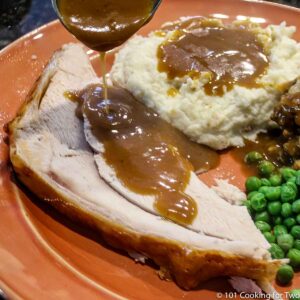
Oven-Roasted Turkey Breast at 350°F (Easy & Juicy)
Video Slideshow
Ingredients
- 5-9 pounds bone-in turkey breast - thawed
- 1 tablespoon oil or butter
- salt to taste - or seasoning of your choice
- ½ cup flour
- 4 cups broth - turkey or chicken
- salt to taste
Step-by-Step Instructions
Prep
- Fully thaw the turkey breast before proceeding. Preheat oven to 350°F with the rack set low enough so the breast will sit in the center of the oven. Use conventional (not convection) baking.
Remove the backbone and trim
- Remove any gravy packet or extras. Cut out the backbone if present using kitchen shears or a heavy knife. If there's a pop-up timer, ignore it—but don’t remove it (that can cause juice loss).
- Trim off any excess skin, like the neck flap, and pat the breast dry with paper towels.
Break the rib sections
- Break back the rib sections to create a flat base. The weak point is about an inch from the breastbone—use firm pressure or a knife if needed.
- Place the breast in a roasting pan with a rack if available. For smaller breasts, a cake pan may work; larger ones need a full roasting pan. Spray rack and pan with cooking spray. Position the rib sections to help stabilize the breast upright.
Season and roast
- Brush with oil or melted butter, then season with kosher salt (and any other herbs or spices if using).
- Roast uncovered in the center of the oven. After 1 hour, rotate the pan 180° and brush again with butter or oil. Check the color and temp at 90 minutes—if the skin is browning too fast, tent lightly with foil.
- Continue roasting until an internal temperature of 165°F is reached in the thickest part—usually 16 to 20 minutes per pound.
- Remove from the oven and tent lightly with foil. Let rest 10–15 minutes before carving. The internal temp will rise a few degrees during this time.
Optional Gravy
- While the turkey rests, whisk ½ cup flour into 2 cups of broth to make a slurry. Add the remaining 2 cups of broth to any drippings in the pan. Bring to a boil over medium-high heat.
- Decrease the heat to medium and slowly add most of the broth-flour mixture, whisking continuously. Add more later if needed. Season with salt and pepper to taste. After thickened, simmer for a few minutes to cook the flour.
- Slice the turkey and serve hot with gravy.
Recipe Notes
Pro Tips:
- Thawing tips: See full post for safe thawing methods.
- Brining? Only if you're sure the breast hasn’t been injected or pre-brined.
- Oven rack position: Place the breast so it sits in the center of the oven.
- Leftovers: Store turkey and flour-based gravy for up to 4 days refrigerated or freeze for up to 4 months.
- Nutrition: Based on a ½-pound serving of turkey and ⅓ cup of gravy.
Your Own Private Notes
To adjust the recipe size:
You can adjust the number of servings above; however, only the amount in the ingredient list is adjusted, not the instructions.
Nutrition Estimate (may vary)
Editor's Note: First Published on March 25, 2018. Updated with expanded options, refreshed photos, and a table of contents to help navigation.



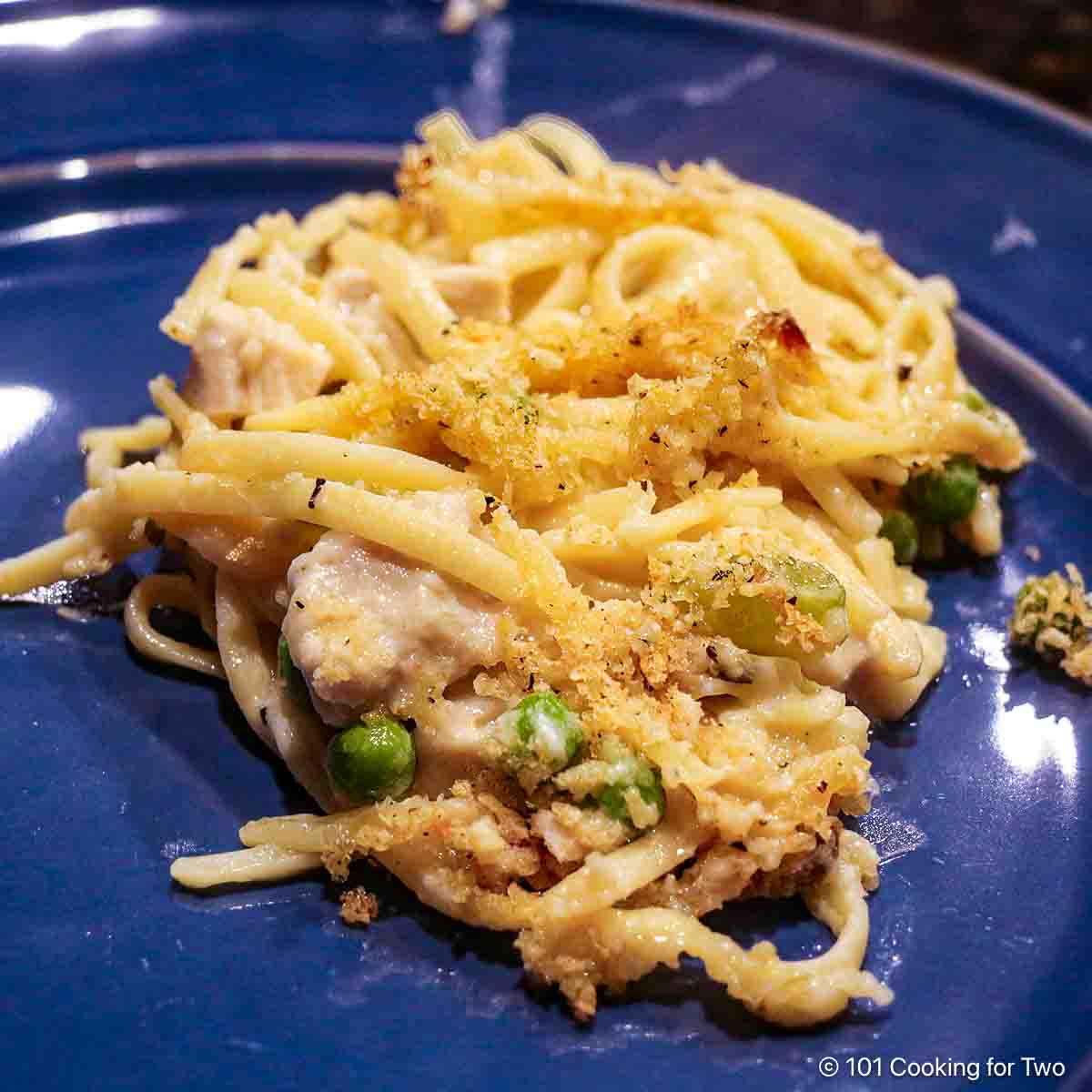




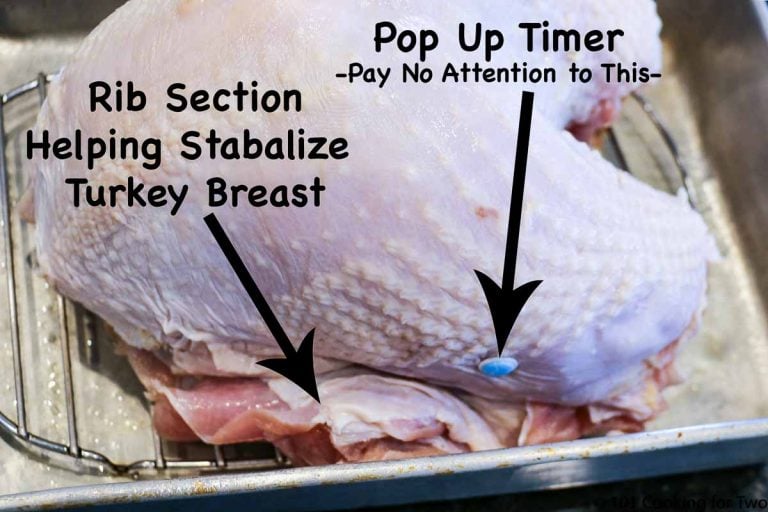







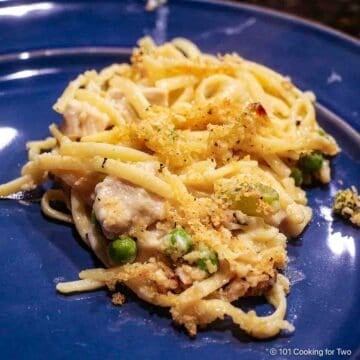

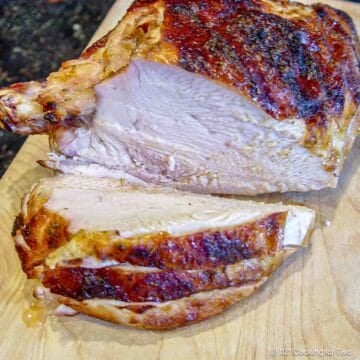
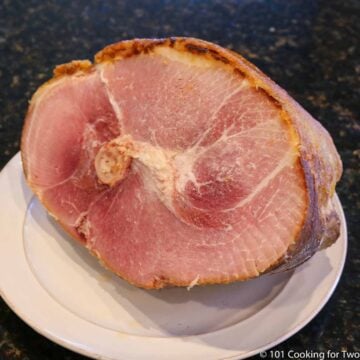
Gauri Buxbaum says
Hi Dr. Dan, We finished the Thanksgiving turkey but I still want to make turkey soup. (I have a very old recipe I haven't made in years and a turkey carcass in the freezer.)
I have an almost-two-pound turkey thigh and I'd like to roast it (along with a cornbread stuffing) in order to have what I need to make the soup. How would I have to adjust your roasted turkey breast recipe in order to wind up with a well-roasted turkey thigh? And can I roast the thigh right on top of the stuffing? Or would it be better to roast them in separate pans?
Thank you. I love your site. Every recipe I've tried (mostly about different ways to cook chicken) has come out great.
Wishing you very Happy Holidays.
Gauribux
Dan Mikesell AKA DrDan says
Hi Gauri,
Welcome to the blog. I can take a stab at it, but it's not something I have done... A 2-lb thigh shouldn't be horribly thick, so 350° should be fine... It will cook fairly rapidly since it is small. And being dark meat, it will be most tender and juicy if cooked to 180–185°. My guess on time is 45 minutes±... in my mind, I'm thinking about a 2-pound meatloaf taking about an hour, but his will be thinner than that. So, cook to temp, not time, obviously here—check early and expect longer.
Your dressing would probably dry at 180, so I would cook it separately.
All that is a guess, but an educated, logical one. Good luck with it.
Happy Holiday
Dan
Michelle S. says
Hi, I'm wondering if you or anyone knows if the time or temperature should be different for an electric oven. This is the first Thanksgiving meal I'm cooking on a fully electric stove, so I'm a little freaked out. My turkey breast is just under 7 pounds and currently thawing in the fridge. Thanks for your help!
Dan Mikesell AKA DrDan says
Hi Michelle,
Welcome to the blog.
The cooking time and time are identical... heat is heat. Be sure the oven is fully preheated and use an instant-read thermometer to check the internal temperature. A 7-pounder (my most common size) will take about 2 hours±. Be sure to adjust the rack so the breast is in the center of the oven. The browning can vary somewhat from oven to oven due to radiant heat reflection.
Hope that helped.
Let me know if you have other questions.
Dan
Mama K says
This was my first time to cook a turkey breast (without the rest of the bird), and I was actually just trying to figure out which side to place up in the pan when I stumbled upon this recipe. I had never even considered splitting anything apart, but I decided to give it a go. I am certainly glad that I did!! This was super easy, faster than the original packaging predicted, and the finished product was tender & delicious. I'm bookmarking this one for next time I need to be reminded of exactly "what did I do last time that worked out so well? 🤔" Thank you!!
David says
I didn't want to rate this recipe, just put a comment that I had a 7lb turkey breast and it took 3.5 hours to get to 160 (in some places). it was 170 in other places and 155 in others. This seems to always happen to me when taking meat temps. Do you think my thermometer is broken? I made sure it was deep but not touching bone for readings. I can tell it seems very tough already. I'm afraid it will be too dry but I was just following the temp instructions.
Dan Mikesell AKA DrDan says
Hi David,
Welcome to the blog.
About your issues. Something is wrong with the thermometer or the oven. Or the breast is not fully thawed. My suspicion is the thermometer. You can test it by boiling water on your stovetop and check the temp which will be 212°.
Since the meat is dry, it usually means overcooked. The oven is less likely to be far that far off, although prolonged cooking at a lower temp would dry out the meat.
Hope that helps.. my money is on the thermometer.
Dan
PS. forgot to add to fully preheat the oven before starting.
Dana Stieferman says
I need to do a whole turkey for a gathering. All I find on your site are for turkey breasts - can you get us a whole-turkey recipe for next year? I would prefer a smoked recipe, would like to try a grilled turkey, but a roasted recipe will do.
Thanks a bunch!@ Happy Thanksgiving.
Dan Mikesell AKA DrDan says
Hi Dana
Welcome to the blog.
Email with attached PDF sent.
Dan
Jim Coggs says
Hi Dr. Dan
Can you put stuffing under the breast?
Maybe cook a little longer?
Dan Mikesell AKA DrDan says
Hi Jim,
Welcome to the blog and good question.
It is all about safety which means temperature. So yes, as long as you get the stuffing to 165 in all areas. But you do not want to overcook the turkey. So, remove the breast when it is 165 and you can leave the dress in to reach the required 165 while the breast rests to absorb the fluid back into the cells.
I see two issues, first, the pan is tied up with the dressing so my gravy is either skipped or another method is needed. And the second is the dressing will be cooked under the weight of the breast, leading a compressed texture I probably wouldn't prefer.
Hope that helps.
Dan
Anita says
I found this recipe last year and forgot to save it and Thank Goodness I came across it again this year. It's just me and my husband right now and even if we do get invited over to family I always like to make turkey that weekend and have our own dressing and gravy. Yes, it's Thanksgiving Day right now and the breast is going in the oven in about 30 minutes. This time I will try and cut the backbone properly. And thank you for the Penzley's tip. I have family that is in a city right now where they have a location. I am going to ask them to pick it up for me. Thanks Dr. Dan!